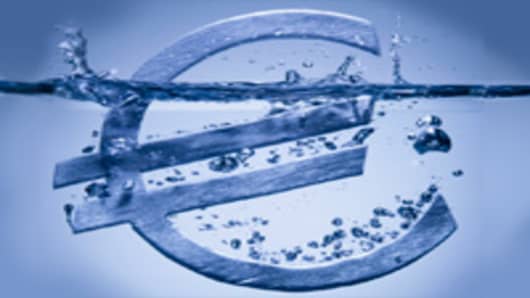As strikes threatened to bring struggling Greece to a standstill Wednesday, pessimism about the future of the euro zone--in its current form, at least--continued to plague the Continent.
Speculation that the Mediterranean country would have to default on its debt repayments has grown in recent days, after the government there announced that it will not meet deficit reduction targets for 2011.
If Greece were to default, it would hit the balance sheets of many European banks, and potentially even lead to the end of the euro itself.
Petros Doukas, a former Greek deputy finance minister, told CNBC Wednesday that default is "inevitable" and called for an "organized" and "orderly" haircut on the debt to try and stop a run on the banks in the event of a default.
"The capacity of the Greek people to pay taxes is really at the limit," he said. "People like me are paying taxes out of their savings and by selling off assets, not by generating new income."
Greece needs to reduce its deficits and start selling off state-backed assets in order to meet the terms of a second bailout by the International Monetary Fund (IMF) and the European Central Bank, agreed upon in July. However, the Greek protestors are chafing at government-imposed austerity measures.
Elsewhere in the European Union, politicians in stronger economies such as Germany are facing anger from their own people about bailing out the Greeks.
While euro zone policymakers maintain the currency will survive the crisis, increasing doubts are being cast on its future.
One of the arguments put forward for keeping the euro zone together is the importance of maintaining peace in Europe. The European Union grew out of trade alliances formed in the wake of the Second World War, which devastated the continent.
"We can avoid wars without having to run something which looks like a car with two and a half wheels," Jon Moulton, chairman of Better Capital and a well-known British investor, told CNBC Wednesday. "Nobody wants a repeat of the Second World War, but war is more likely with an economic crisis than without it."
"The whole system needs to stop propping up the unsavable," he said. "We need to crystallize the losses. It will be hellish to pay for, but if we don't do it now, it will be worse later."
He said that switching to a free trade arrangement, such as Switzerland has with the EU, would be the best solution.
Moulton said he believes that, like a company, the euro zone either needs to be broken up or ruled with "total control" from the top.
"We have got this intermediate thing… The model is absolute nonsense and has no clear purpose," he said.
In the case of Greece, there has been controversy over whether it submitted accurate economic data when it entered the euro in 2001.
Asked about that dispute, Doukas, who was part of the Greek government between 2004-07, said: "The data has not been different than what Eurostat had approved. There may have been some beautification of the numbers but no more than in Italy or Germany or Holland." Eurostat is the European Union's statistical information service.
He said he believes that Greece's problems will be solved only by "massive privatizations," a moratorium on new taxes, and changes to the labor laws "to allow employers to manage their own affairs."
"If you do this and start getting back into surpluses rather than deficits, then I think this country will grow very, very fast," he added.
Moulton, who thinks it is "much likelier" than not that Greece will default, believes that policymakers need to start working out how to manage the default rather than attempting to avoid it.
"We need to find ways to deal with the failure rather than using sticking plasters for the next few months," he said.





